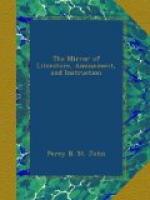sure prognostic of rain; in fact they are the barometer
of the district. I then prevailed on my two companions
to forego their visit to the Abbey that night.
We therefore had in old Davidson, the landlord of
the Inn, and my companions submitted him to an interrogatory
of three long hours’ duration. One little
anecdote of fresh occurrence struck me as possessing
some interest. I will record it. About a
month before, a poor maniac presented herself at the
gates of Abbotsford. She desired to see Sir Walter.
The servant denied her admittance, but such was the
earnestness of the poor creature, that auld Saunders,
on her pressing application, went and informed his
master, “that a puir demented lassie was at
the gett (gate) greetin’ like a bairn.”
Sir Walter had the kindest of hearts; “O admit
her puir thing,” he said. The woman no
sooner entered than she fell on her knees in reverential
awe before Sir Walter. Her story was simply this.
She belonged to Aberdeen; she was married to a young
farmer in that neighbourhood and had not long before
given birth to a beautiful infant, the first pledge
of their loves. The pains of birth had injured
her mental equanimity, and eluding the vigilance of
her keepers she set forward one evening in search of
the great enchanter, whose works had in happier hours
beguiled her with their beauty. She travelled
for a week; the distance from Aberdeen to Abbotsford
was about a hundred and fifty miles. She had walked
every step. Sir Walter did what he could to soothe
her distracted mind, and get her wasted frame recruited.
But after some time he deemed it advisable to exercise
his judicial power and put her in a place of security,
until definite intelligence could be procured of her
friends and relations. Jedburgh is the county
town of Roxburgh; and thither all wanderers of this
and a less gentle race are sent. A post-chaise
was sent for from old Davidson, of the George, and
when it was at the door of Abbotsford, Sir Walter
induced the poor girl to enter it, promising to accompany
her “out a ridin’.” She entered—looking
for him to follow. The door was instantly closed,
and the post-boy lashing and spurring his horses,
darted off in a second. She gave a piercing shriek,
looked wildly round her, and abandoned herself to
the most agonizing despair; exclaiming in a tone of
the utmost pathos, “ah! deceitfu’ man,
hae ye beguiled me too!”—and then
she sunk back in the carriage, and buried herself
in the deepest silence. * *
18th August. Set out to view the ruins of Dryburgh Abbey. Called on Capt. (now Sir David) Erskine, from whom I received the politest attention. His housekeeper acted as my cicerone, and conducted me over the venerable pile. These time-worn ruins stand on the north bank of the Tweed, by which they are almost surrounded, and are backed by hills covered with wood, of the richest foliage. The abbey as well as the modern mansion house of the proprietor, is completely embosomed in wood. Around this




